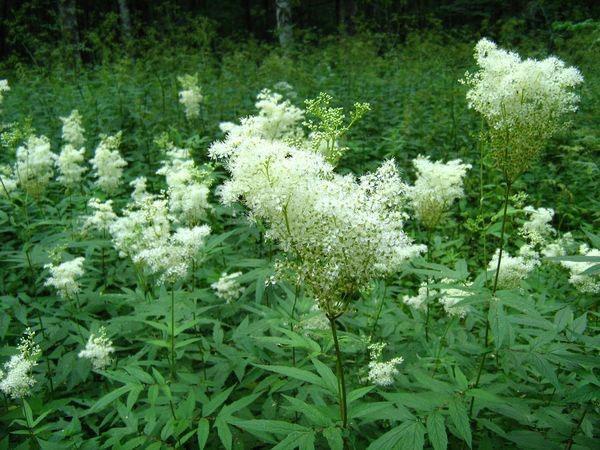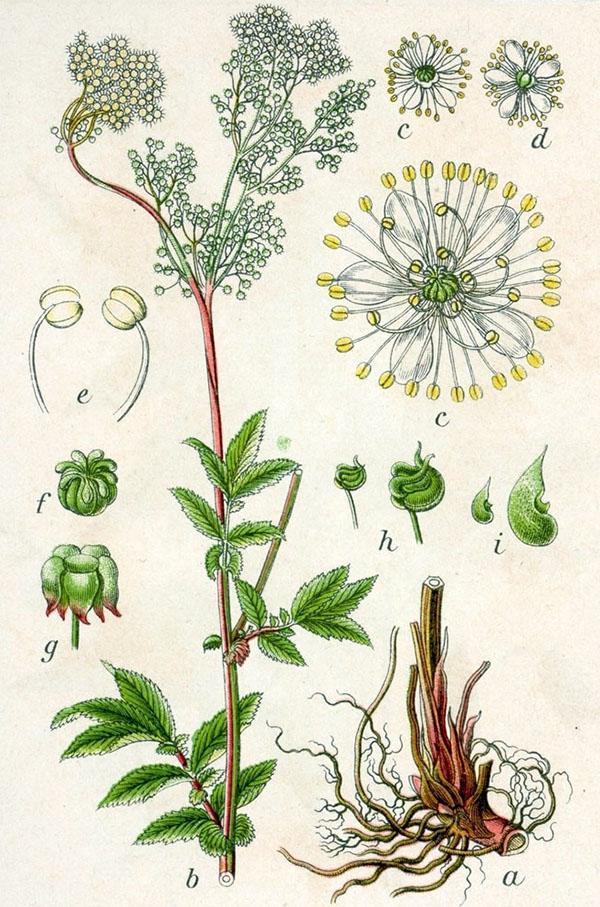Healing gift of nature: meadowsweet, its medicinal properties and contraindications
 Very often, plants that are grown in personal plots as ornamental have a huge number of useful properties. To obtain a therapeutic effect, you should find out what is meadowsweet, its medicinal properties and contraindications.
Very often, plants that are grown in personal plots as ornamental have a huge number of useful properties. To obtain a therapeutic effect, you should find out what is meadowsweet, its medicinal properties and contraindications.
General information, types

Not all of the 13 species of meadowsweet available have medicinal properties.
Healing includes:
- viscous;
- palm-shaped;
- Kamchatka;
- six-petal.
The most popular and more common species is meadowsweet, its useful properties and contraindications are similar to other species. The stems of this plant can reach up to 2 meters in height. White inflorescences with a creamy yellowish tinge, seem fluffy, thanks to the long stamens sticking out in different directions.
The medicinal properties and contraindications of meadowsweet are due to the presence in the plant of the chemical component methyl salicylate, salicylic aldehyde, ascorbic acid. These ingredients have strong anti-inflammatory properties. Its specific smell often interrupts even the rich aroma of inflorescences.
Meadowsweet is used not only as a medicinal plant:
- the roots of the plant can be used for tanning leather, since they contain a large amount of tannins;
- inflorescences are used to brew herbal tea;
- flowers are used for tinctures and flower wine;
- young greens of meadowsweet are used as seasonings;
- flowers are added to fruit salads.
The plant is harvested at the beginning of flowering, while there are still not many tannins in it. Dry the meadowsweet in the shade, providing good ventilation.
Therapeutic uses of meadowsweet
 All parts of the grass meadowsweet have healing properties:
All parts of the grass meadowsweet have healing properties:
- Roots. Used in the treatment of nervous disorders, to remove various types of parasites. Also used to stop bleeding.
- Stems and leaves. It is used for colds, decreased performance, and insomnia.
- Inflorescences. Help as diaphoretic, antidiarrheal, diuretic.
The meadowsweet has both medicinal properties and contraindications.
The herb is of particular importance for people with diabetes. Also, the medicinal properties of meadowsweet significantly alleviate the problems that accompany diabetes - obesity, high blood pressure, disorders of the central nervous system. It helps keep blood vessels and veins healthy and prevents blood clots.
This plant is used in the treatment of neuralgia of various etiologies, with neuritis, inflammation of the nerve endings, and epilepsy.
Also, meadowsweet is called natural natural aspirin.
The meadowsweet has the following medicinal properties (be careful, there are contraindications):
- fortifying;
- antipyretic;
- vasodilators;
- choleretic;
- astringents;
- antiviral;
- diaphoretic;
- tonic;
- antibacterial;
- diuretics;
- sedatives;
- antitoxic;
- blood-restorative;
- anthelmintic.
Meadowsweet helps with nausea.Therefore, when going on a long trip by car or on a sea ship, it is worth stocking up on a tincture of the plant.
Application methods
 When taking meadowsweet, it is necessary to observe the drinking regime, since it contains salicylates, which have a diaphoretic effect. Due to excessive sweating, blood clots may occur.
When taking meadowsweet, it is necessary to observe the drinking regime, since it contains salicylates, which have a diaphoretic effect. Due to excessive sweating, blood clots may occur.
It is necessary to store the finished medicinal product in the refrigerator, no more than 3 days.
Contraindications
 Before you start using drugs based on meadowsweet or meadowsweet, you must familiarize yourself with the list of contraindications:
Before you start using drugs based on meadowsweet or meadowsweet, you must familiarize yourself with the list of contraindications:
- chronic constipation and a predisposition to them;
- hypotension (low blood pressure);
- thrombocytopathy (decreased blood clotting);
- colitis;
- hypersensitivity to the components of the meadowsweet;
- pregnancy and lactation;
- stomach ulcer;
- gastritis;
- children's age (up to 12 years old).
Meadowsweet oil is especially popular due to its medicinal properties. Contraindications for its use depend on the presence of chronic diseases. This drug is strictly prohibited in the presence of stones in the gallbladder. Oil can cause them to move.